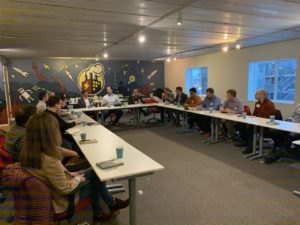2nd Quarterly MSP Product Leader Peer Group
On Wednesday, we were proud to host the 2nd quarterly Product Leader Peer Group. We were thrilled to be hosted by our friends at Livefront and had over 20 product leaders from companies including Polaris, Livefront, US Bank, Dispatch, Best Buy, UnitedHealthcare, Bright Health, Carrot, and several independent product consultants.
The MSP Product Leaders community is designed to be a safe forum where product leaders from the Twin Cities can learn from each other and discuss critical challenges to growth and team development.
To kick off the product leader peer group, we discussed the common challenges facing those who lead product teams.

Here were the challenges that emerged:
- Building teams & finding talent is an ongoing challenge for every product leader. Product managers and owners are in high demand and can often self-select companies or industries they want to work in
- Not knowing where to start when building completely new products is always difficult. The most common place to start is the customer problem, but moving from there can be a real challenge
- Keeping the ax sharp with personal development and networking while still in the trenches of the day job. Networking while focused on the team and company was a challenge for almost all our leaders. It has to be a focus and deliberate when you are in the middle of the work to get out of your four walls and meet other people from different companies and industries
- Many people commented that there are great resources for product managers, but there aren’t great resources for product leaders. There’s no playbook for leading the teams responsible for building the products
- Moving from Project to Product is a challenge that almost everyone has faced. Knowing what the roles, skills, mindsets, processes, systems, tools and technology needs are as organizations progress through that transformation is challenging to find and manage
- Being the firewall between your teams and the rest of the organization, while still giving the team visibility and exposure with senior leadership and stakeholders. How can I unleash them to solve problems, not just deliver on a roadmap from executives? How can I be that blocker and tackler of the politics while the team is protected to fail and learn?
- Building roadmaps that are realistic and selling them through the organization. Senior leaders today don’t manage product leaders in a way that allows them to truly solve business challenges
- Getting executives to align on product KPIs and not focus on vanity metrics. Socializing the right ‘North Star’ metrics for your product is difficult
We discussed two main topics during the event. The first is how to navigate the rough waters of transforming an organization from a project management framework to product management. The second key theme we discussed was how to coach your product teams.
Project to Product Management
Moving from project to product within an organization is a challenge felt at all levels. Unless your company DNA was founded with a product and agile mentality, even when teams are able to move at the speed needed, they often face hurdles from the rest of the organization that operates differently.
While there is no silver bullet or perfect approach, here are several ways to be successful in this transition:
One of the biggest challenges for teams that are moving from project to product is how to handle the existing roles. Do your project managers simply get a new title and become product owners? What do you do with business analysts (BAs)?
At Target, we discussed the strategy of ripping the bandaid off. Given the lack of time, the first move was to get the existing resources into the new structure. From there, the talent strategy was in place to train those that could make the transition to a new way of working and over time, bring in outside resources that fit the mold.
Another challenge that many senior leaders have is not setting the context of the change before actually making moves. It’s critical to bring the team along and help them understand the Why before working through the How. This is a critical organizational change that starts with the culture, mindset, and values of the new world. Not bringing people along and making them be a part of the process, rather than just the recipient of it, is a recipe for disaster.
Team sizing in the product model is often a challenge for those making the transition. Right-sizing the teams as quickly as possible is a critical decision that must be made by senior leaders. Often, the old thinking permeates these decisions and the result is the formation of teams that too big.
Finance is often a group that struggles with this change. The complete shift of funding teams, not projects, requires a complete transformation for how finance views the world. Funding capacity and not discrete projects are the most common ways mature product organizations operate.
Coaching and Leading Product Teams
We spent the last part of the event discussing how to lead and coach product teams. The discussion was compelling and we could have spent the entire session on this topic alone.
Here were the themes that emerged:
One of the critical skills a product leader must have is knowing how to coach product managers to define their product’s vision and roadmap. Helping a product owner through the process of defining these strategies with their teams and not in a silo can rally the team around the vision.
Another area of focus when coaching product owners is helping them define the measurement strategy for their products. How will you know when you’ve been successful? What are the North Star metrics to focus on and what are the vanity metrics that should be avoided?
Coaching product owners to see around the corner and expect what questions they will get from senior leaders and stakeholders is a useful skill for product leaders. Leveraging data to make informed prioritization decisions and trade-offs help immensely in this area.
The last theme of the discussion for coaching product teams centered around building a community of practice leaders. Being a product owner can be lonely. Creating forums around the organization’s product practice can lead to the cross-pollination of ideas and methods. This is also a great way for product owners to feel less isolated.
Conclusion
Given the conversation has no signs of slowing down as the event concluded, it was clear that while product leaders play a critical role in any organization, they often lack the support, resources, and tools to effectively lead their teams. That’s why forums like this one are so important.
Again, a big shout out to our good friend Mike Bollinger at Livefront for hosting the group this quarter! Livefront is a mobile application strategy and development firm that has helped numerous companies build incredible mobile experiences.
If you are interested in learning more about the MSP Product Leaders Peer Group, please connect with Joe Ruekert at joe@hellofahren.com.
Looking for product management leadership, advice and talent? Contact Fahren today.



